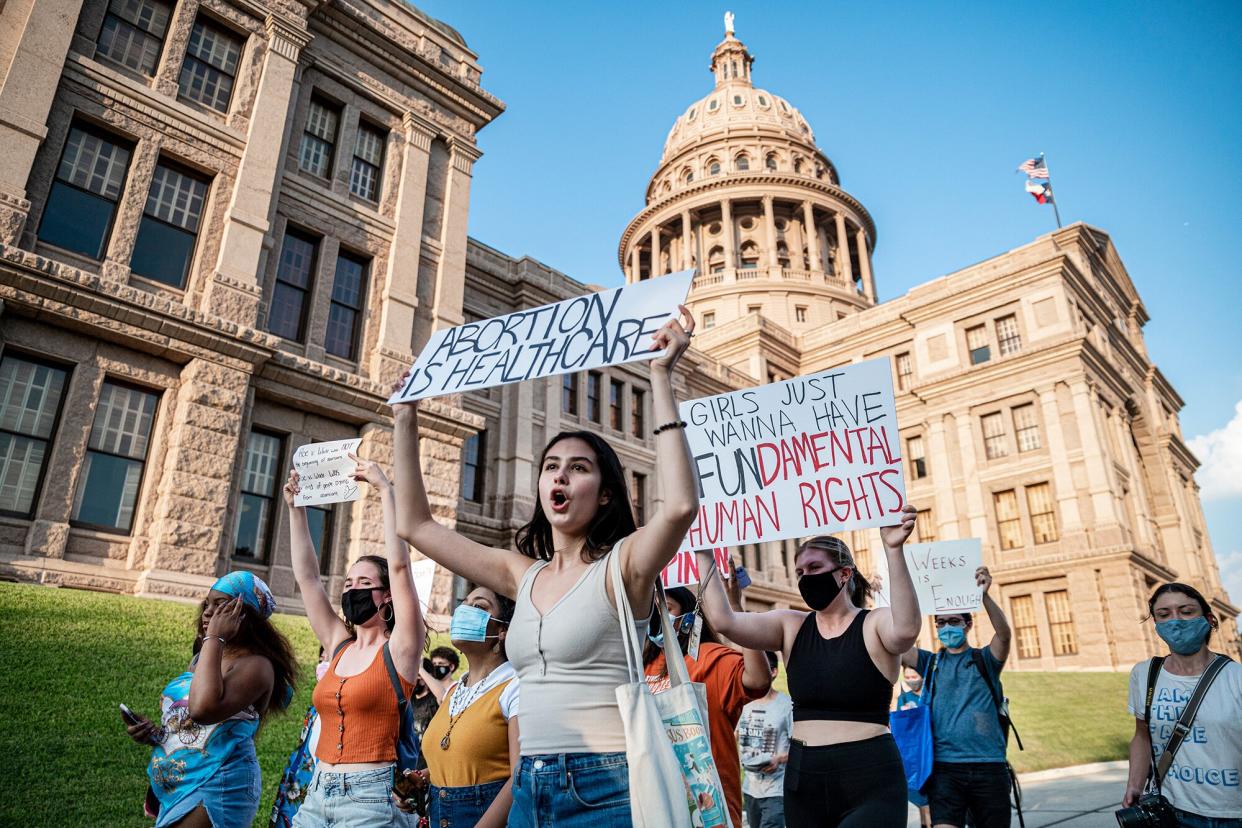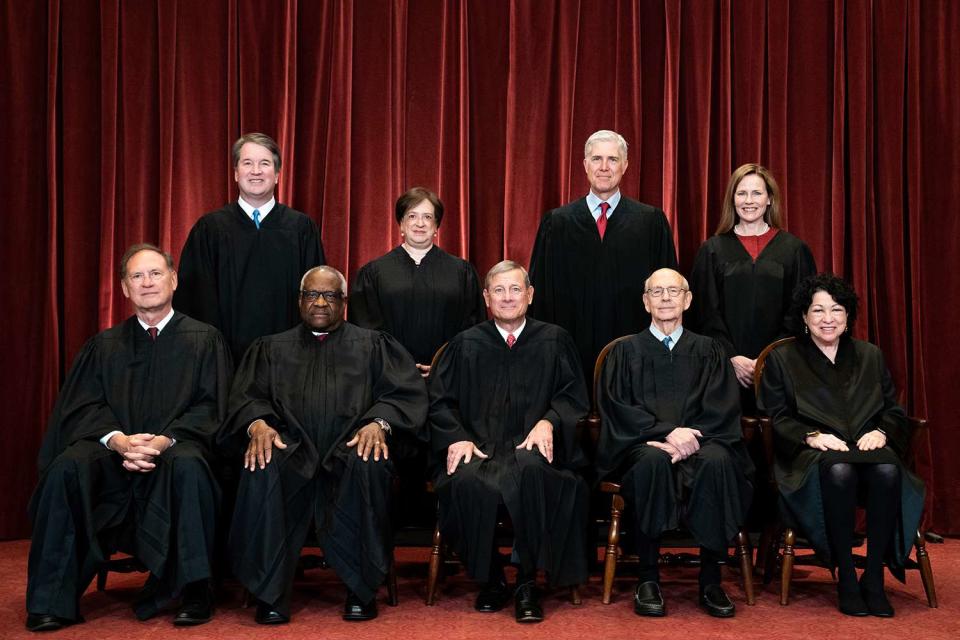Supreme Court to Hear Arguments on Abortion Ban and Could Overturn Roe v. Wade

Sergio Flores For The Washington Post via Getty Pro-choice protesters march outside the Texas State Capitol on Wednesday, Sept. 1, in Austin, Texas.
On Wednesday, the Supreme Court will hear arguments on Mississippi's law banning abortions after 15 weeks of pregnancy, which goes against the 25 weeks guaranteed by Roe v. Wade.
In 2021 alone, a record 106 restrictions on abortions became law in the U.S. It's the most since the landmark Roe v. Wade case was decided in 1973.
"We've entered into a new, more restrictive phase in 2021 because we now have a solidly anti-abortion Supreme Court," Elizabeth Nash, state policy analyst at the Guttmacher Institute, a research group focused on abortion rights, tells PEOPLE. "That really signaled to state legislators that more restrictions and even bans on abortion could potentially go into effect, and we started to see state legislators moving in that direction by adopting early abortion bans."
In past years, states that tried to enact anti-abortion legislation knew that it would be struck down by state and federal courts following the precedent set by Roe v. Wade. But now, with Justice Amy Coney Barrett joining the Supreme Court in Oct. 2020, it firmly established a conservative majority and the chance that Roe v. Wade could be overturned.
The change in the court makeup is what led to Texas' ban on abortions after six weeks of pregnancy — before most people know they are pregnant — and why it was upheld after the Supreme Court was asked by abortion rights groups to block the ban from going into effect.
There had already been a rise in abortion bans in 2019, after conservative justices Brett Kavanaugh and Neil Gorsuch joined the Court, but "while there was momentum behind these, there was a little more uncertainty" about how the Court would decide on any laws. "Now that uncertainty is gone," says Nash. "It's obvious that the Supreme Court is not supportive of abortion rights. And now we're waiting to see how far they will go."

Erin Schaff-Pool/Getty
And even if Roe is not fully overturned with the Mississippi case, they have the opportunity to do that with a number of other challenges to the right to abortion coming from state bans in Arkansas, Oklahoma, Missouri and others.
"There is nearly 50 years of precedent upholding abortion rights by the Court. And whether or not the Court will disregard all of those court cases is still a bit up in the air," Nash says. "They have any number of things that they can do, from directing the states that more restrictions are permissible to upholding the 15 week ban to overturning Roe entirely."
RELATED: Abortion Rights Activists Lead More Than 650 Marches Around U.S. in Protest of Restrictive Bans
Nash expects the decision "to be very complicated," and one that Americans won't know the result of until the end of the Supreme Court's term in June 2022.
"I don't really hazard a guess as to what the Court will do except to say that it feels like abortion rights are in serious jeopardy given the makeup of the Court."
RELATED VIDEO: 'I Pray for All ... Who Will Suffer': Many Stars Are Outraged at Sweeping Alabama Abortion Ban
If Roe is overturned, "then I would expect in fairly short order we would start to see states, particularly the South, the Plains and Midwest, look to adopt abortion bans," Nash says. Twelve states, including Mississippi and Texas, have "trigger" laws in place that would automatically ban abortions if that happens.
"And that would make it very hard for a large percentage of women in the country to access abortion care in their own state. It means a lot more people would have to travel for care. And the people who are most impacted by these abortion restrictions and bans are people of color, low-income individuals, young people and LGBTQ individuals. The people who are already burdened with insufficient access to healthcare."
Bans in any state push people into unwanted pregnancies, or into seeking ways of obtaining an abortion out of state.
"A typical abortion costs about $550," Nash says. "If you have to travel any distance at all you start thinking about the costs for gas, hotel, travel, childcare and time off of work. And these costs increase dramatically the longer you have to be away from home and the farther you have to go."
And even if they are stopped, any bans, no matter how short, have an impact.
"Once abortion is banned in a state it makes it very hard if the ban is overturned to rebuild the abortion clinic network and for people to understand that abortion is then legal again," Nash says. "Even if it ends up only being for a few weeks before it gets blocked, there's a lot of damage that's already been done."
There are efforts to maintain the right to abortion, even if Roe is overturned. Many states such as New York, Hawaii, California and Washington have statutory protections for abortion rights in their laws. And with the executive and legislative branches of the U.S. government in support of abortion rights, there are plans in the works to stop the Texas ban and create legislation like the Women's Health Protection Act, a bill currently in Congress that would prevent abortion bans and other restrictions.
RELATED: House Passes Legislation to Protect Abortion Rights amid Legal Challenges to Texas Ban
"What we need to see are more of these progressive legislatures step up to provide these statutory protections and provide resources to make sure that abortion is accessible —whether that's financial or expanding who can provide abortions, or making it easier to access abortion care," Nash says. "Getting involved with your state legislature is important, along with supporting abortion funds at the state level and the local level. Being supportive, putting your money where your mouth is and making your voice heard is the best way to protect the right to abortion."

